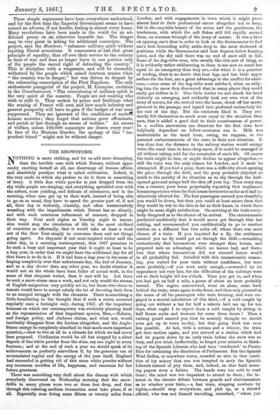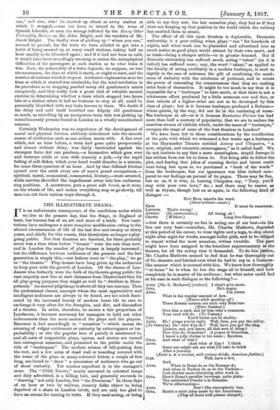THE SNOWSTORM.
NOTHING is more striking, and let us add more dismaying, than the terrible ease with which Nature, without appa- rently exerting herself at all, can disarrange all human affairs,
and absolutely paralyze what is called civilization. Indeed, in the very mode in which she prefers to do it there is something of irony. A little fine white powder is just dropped from the sky while people are sleeping, and everything sprinkled over with the softest, most yielding, and delicate of substances, and in the morning, when men get up to their work, instead of being able
to go on as usual, they have to spend the greater part of, if not all, their day in violently, clumsily, and often unsuccessfully wrestling with the impediments which Nature has so silently, and with such courteous refinement of manner, dropped in their way. Four such nights as Tuesday night in succes- sion would stop the circulation of life in the most civilized of countries so effectually, that it would take at least a week out of the New Year simply to overcome them and set things going again. An eloquent if not semi-inspired writer said the other day, in a morning contemporary, that 1867 promises to be such a busy and important year that it ought at least to be a leap year, in order that we might have the additional day for all that there is to do in it. If it had been a leap year in the sense of leaping completely over that unfortunate day, the 2nd of January, and so a day shorter than any other year, we doubt whether it would not on the whole have been fuller of actual work, in the sense of that eloquent writer, than it now will be. Let there be such a snow-storm once a week, and not only would the stream of English emigration very quickly set in, but those who chose to remain would have to accept calmly the lot of devoting their lives to an unequal struggle with the elements. There is something a little humiliating in the thought that if such a storm occurred regularly once a fortnight only, during 1867, all the important business on which our contemporary was evidently pluming itself as the representative of that important species, Man,—Reform, and foreign policy, and Alabama claims, and what not, would inevitably disappear from the horizon altogether, and the Anglo- Saxon energy be completely absorbed in that much more important question,—how to live at all in a climate for which we had never been prepared. Civilization would be all but stopped by a silent deposit of fine white powder from the skies, say one night in every fourteen ; and at the end of such a year we should speak of its achievements as perfectly marvellous if, by the generous use of accumulated capital and the energy of the year itself, England had succeeded in getting rid of this same white powder without any enormous sacrifice of life, happiness, and resources for her future greatness.
There was something very droll about the dismay with which everybody discovered on Wednesday morning that the snow- drifts in many places were two or three feet deep, and that through this resisting medium locomotion must take place, if at all. Especially men living some fifteen or twenty miles from London, and with engagements in town which it might prove' almost fatal to their professional career altogether not to keep, felt in the exquisite beauty of the scene, and the gentleness, the tenderness, with which the soft flakes still fell rapidly around them, no common triumph of the irony of nature. It was a blow on opening one's door in order to look at the thermometer to find one's foot descending softly ankle-deep in the most sheltered of positions, while the thermometer said four degrees below freezing_ point, and the sky said there was no end of snow still to fall.. Some of the dog-tribe even, who usually like this sort of thing, as it is evidently rather exhilarating to them to see men so much less equal to an emergency than they are,—for when it is a question. of wading, there is no doubt that four legs, and but little upper surface for the foot, are a great advantage in the conflict for exist- ence,—even some of the dog-tribe were subdued, when on sally- ing into the snow they discovered that in many places they could easily get hidden in it. One little terrier we saw shook her head violently on emerging, and evidently took our own view of the irony of nature, for she retired into the house, shook off her snowy garment in the passage, and lapsed into profound melancholy for the rest of the day. But the retrievers liked it. They evi- dently felt themselves so much more equal to the situation than men, that it added a good deal to their consciousness of power.. In a sudden snowstorm one discovers for the first time how' helplessly dependent on fellow-creatures one is. Milk was- unattainable at the usual hour, owing, we suppose, to the' personal embarrassments of the cows in their new situation. It was clear that the distance to the railway station would occupy twice the usual time in knee-deep snow, if it could be managed at all without taking cold for the remainder of one's life. Of course the train might be late, or might decline to appear altogether,— still the train was the only chance for London, and it must be attempted. If you had a pony, there was a difficulty about opening the gates through the drift, and the pony probably objected se. much to the novelty of its situation as to shy through the half-- opened gate and scrape half the skin off your leg. Then every step. was a venture, your horse perpetually repeating that unpleasant humanexperience when the foot comes down twice as far as it had in- stinctively allowed for. The foot passengers assured you cheerfully you would be down, but then you could at least assure them that they would be wet to the skin as far as their knees, in which there might be some slight satisfaction. On arriving at the train every- body disagreed as to the chance of its arrival. The stationmaster- predicted confidently that it would never get through that last cutting, and recommended you confidentially to go to another' station on a different line two miles off, where there was more chance of a train. If you inquired for a fly, the stablemen assured you no fly could get on through the drift,—remarking sententiously that locomotives were stronger than horses, and prepared rails an advantage which no horses had, and there- fore that where locomotives did not succeed horses would in all probability fail. Satisfied with this unanswerable reason- ing, you waited for your train without confidence, but were most probably,—if you were early enough,—rewarded by its appearance not very late, for the difficulties of the railways were not at their height till ten o'clock. Then you got in, and when you had got on half a mile, a pause of about an hour probably ensued. The engine manceuvred, went on alone, came back behind the train, went again to the front, and then only groaned in the name of all the passengers who were freezing, and were en- gaged in a mental calculation of this kind,—if a cold caught by going out without a hat for half a minute laid me up for ten days, what ought I to expect from a cold caught by sitting in half frozen socks and trousers for some three hours ? Then a railway guard assured you that he scarcely thought we should even get up to town to-day, but that going back was even less possible. At last, with a scream and a wheeze, the train got into motion again, and you arrived at a station which had had its papers down by an early train before the snow was so deep, and you tried, ineffectually, to forget your miseries in think- ing of the Spanish Liberals who had been ' conducted ' to Puerto Rico for criticizing the dissolution of Parliament. But the Spanish West Indies, or anywhere warm, sounded so nice in that condi- tion of icy misery that one was tempted to envy the Spanish Liberals instead of pity them, and, indeed, on that fatal morn- ing papers were a failure. The hands were too cold to read them ; the mind was too impatient to attend to them ; the in- terest in the chronic debate between guards and stationmasters as to whether your train,—a fast train, stopping nowhere by rights,should stop everywhere, and pick up, as a shrewd official, who was not himself travelling, remarked, "whom you can," and also, alas ! be snowed up afresh at every station at which it stopped,—was too keen to attend to the woes of Spanish Liberals, or even the wrongs inflicted by the Every Other Fortnightly Review on Mr. John Bright, and the vendetta of Mr. Jacob Bright. The thrifty view of picking up "whom you can," seemed to prevail, for the train we have alluded to got into a habit of being snowed up at many small stations, taking half an hour usually to be liberated again ; and if it had not been so cold, it would have been exceedingly amusing to notice the metaphysical difficulties of the passengers at each station as to what train it was. Now, the personality of a train depends, we suppose, on two circumstances, the time at which it starts, or ought to start, and the number of stations which it stops at. Authentic explanation as to the time at which it started was attainable, but the total revolution in its procedure as to stopping puzzled many old gentlemen's minds completely, and they really took a great deal of valuable mental exercise in determining whether a train which stopped two hours late at a station where it had no business to stop at all, could be personally identified with any train known to them. We doubt if the delay and cold itself troubled one fidgety old gentleman so much, as travelling by an anonymous train that was picking up miscellaneously persons bound to London in a wholly unauthorized manner.
Certainly Wednesday was an experience of the development' of moral and physical friction suddenly introduced into the smooth course of civilization such as one seldom meets with. A line over 'which, not an hour before, a train had gone quite prosperously and almost without delay, was fairly barricaded against the strongest force Art can produce,—a locomotive which goes over 'and destroys cattle or men with scarcely a jerk,—by the rapid falling of soft flakes, which your hand would dissolve in a minute, for some three-quarters of an hour. And by that diffused friction spread over the earth every one of man's grand occupations,— spiritual, moral, economical, commercial, literary,—were arrested, while navvies shovelled the impediment away into less embarras- sing positions. A snowstorm puts a great soft break, as it were, on the wheels of life, and makes everything stop or go slowly, till men can cut their various ways through it.





































 Previous page
Previous page